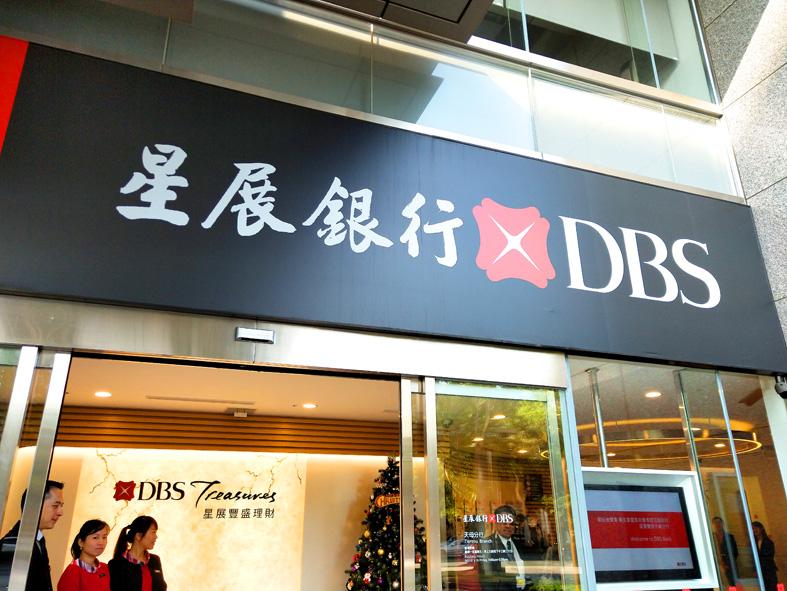DBS Bank Taiwan (星展銀行) has provided a two-year sustainability-linked loan (SLL) worth NT$1 billion (US$35.05 million) to Wistron Corp (緯創), with the loan’s interest rate set to fall next year at the soonest if Wistron’s sustainability performance improves, the lender said on Wednesday.
That marked DBS Taiwan’s second major sustainability-linked loan after a NT$2 billion loan to AU Optronics Corp (AUO, 友達光電) in 2019.
Similar to its loan arrangement with AUO, DBS Taiwan would lower the interest rate on Wistron’s loan if the debtor reaches several targets regarding environmental, social and governance (ESG) practice.

Photo: Lee Chin-hui, Taipei Times
The targets were set by DBS after discussions with the debtor, the bank said.
DBS would assign third-party institutions to review the contract electronics maker’s ESG practice based on the firm’s corporate social responsibility report this year.
If the results of the review indicate that the targets have been achieved, the interest rate would be reduced next year at the earliest, the bank said.
“We hope to provide an effective incentive for companies to advance their ESG programs,” DBS head of institutional banking group Tony Luo (羅綸有) said in a statement.
Wistron, whose products include handsets, servers, laptops, PCs, tablets, video game consoles and LCD modules, ranked among the top 5 percent in the Taiwan Stock Exchange’s corporate governance evaluation, the bank added.
DBS did not reveal the targets for Wistron, citing confidentiality agreements.
However, according to the Financial Supervisory Commission, an SLL approval should be tied to a debtor’s practices in environmental protection, social welfare, or corporate governance, such as greenhouse gas reduction, waste management, water efficiency and food security.
“It has been a global trend to balance business and sustainable development.” DBS Taiwan general manager Lim Him Chuan (林鑫川) said in a statement.
DBS Taiwan’s parent company, DBS Bank Ltd, has raised its sustainable finance target to S$50 billion (US$37.2 billion) by 2024, accelerating its sustainability agenda of helping clients incorporate sustainable business practices into their overall business strategy, Lim said.
DBS Taiwan was the first bank in the nation to issue an SLL, followed by HSBC Bank (Taiwan) Ltd (匯豐台灣商銀) and Taipei Fubon Commercial Bank (台北富邦銀行).
The former offered the loans to Taya Group (大亞集團) and Sinbon Electronics Co (信邦電子) last year, while the latter provided financing to Merry Electronics Co (美律實業) earlier this year.
Overall, the sustainable finance market in Taiwan is growing, albeit at an early stage, compared with green finance or regular finance, commission data showed.

Intel Corp chief executive officer Lip-Bu Tan (陳立武) is expected to meet with Taiwanese suppliers next month in conjunction with the opening of the Computex Taipei trade show, supply chain sources said on Monday. The visit, the first for Tan to Taiwan since assuming his new post last month, would be aimed at enhancing Intel’s ties with suppliers in Taiwan as he attempts to help turn around the struggling US chipmaker, the sources said. Tan is to hold a banquet to celebrate Intel’s 40-year presence in Taiwan before Computex opens on May 20 and invite dozens of Taiwanese suppliers to exchange views

Application-specific integrated circuit designer Faraday Technology Corp (智原) yesterday said that although revenue this quarter would decline 30 percent from last quarter, it retained its full-year forecast of revenue growth of 100 percent. The company attributed the quarterly drop to a slowdown in customers’ production of chips using Faraday’s advanced packaging technology. The company is still confident about its revenue growth this year, given its strong “design-win” — or the projects it won to help customers design their chips, Faraday president Steve Wang (王國雍) told an online earnings conference. “The design-win this year is better than we expected. We believe we will win

Chizuko Kimura has become the first female sushi chef in the world to win a Michelin star, fulfilling a promise she made to her dying husband to continue his legacy. The 54-year-old Japanese chef regained the Michelin star her late husband, Shunei Kimura, won three years ago for their Sushi Shunei restaurant in Paris. For Shunei Kimura, the star was a dream come true. However, the joy was short-lived. He died from cancer just three months later in June 2022. He was 65. The following year, the restaurant in the heart of Montmartre lost its star rating. Chizuko Kimura insisted that the new star is still down

While China’s leaders use their economic and political might to fight US President Donald Trump’s trade war “to the end,” its army of social media soldiers are embarking on a more humorous campaign online. Trump’s tariff blitz has seen Washington and Beijing impose eye-watering duties on imports from the other, fanning a standoff between the economic superpowers that has sparked global recession fears and sent markets into a tailspin. Trump says his policy is a response to years of being “ripped off” by other countries and aims to bring manufacturing to the US, forcing companies to employ US workers. However, China’s online warriors